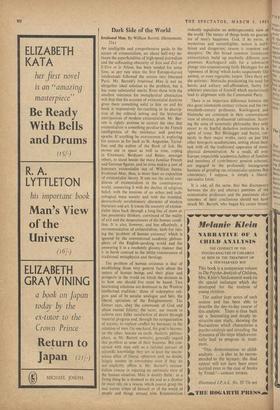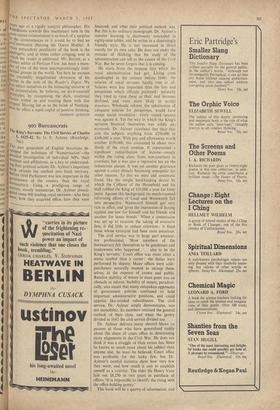Dark Side of the World
AN intelligible and comprehensive guide to the nature of existentialism, set about half-way be- tween the superficialities of high-speed journalism and the suffocating obscurity of Seitz und Zeit or L'Etre et le Neant, has been needed for some time, at any rate since the first Europe-starved intellectuals followed the armies into liberated Paris. Mr. Barrett's Irrational Man is not an altogether ideal solution to the problem, but it has some substantial merits. Even those with the smallest tolerance for metaphysical abstraction will find that his account of existentialist doctrine gives them something solid to bite on and his book is impressively far-reaching in its descrip- tion of the cultural setting and the historical anticipations of modern existentialism. Mr. Bar- rett is rightly anxious to correct the idea that existentialism is something peculiar to the French intelligentsia of the resistance and post-war epochs. If anything he overcorrects it, exploring for sources as far back as St. Augustine, Tertul- lian and the author of the Book of Job. He moves out in space as well as time, roping in Unamuno, Berdyaev and Buber, amongst others, to stand beside the more familiar French and German figures, and he even makes a sort of honorary existentialist out of William James. Irrational Man, then, is more than an exposition of existentialist theory. It sets out the social con- ditions of existentialism in the contemporary world. connecting it with the decline of religious belief, with the tensions of an urban and tech- nological mass society and with the troubled, destructively revolutionary character of modern literature and art. It traces the ancestry of existen- tialist ideas back through a long line of more or less pessimistic thinkers, convinced of the reality of evil and the desperateness of the human condi- tion. It is also, however, and less effectively, a recommendation of existentialism, both for rais- ing the 'problem of human existence' which is ignored by the conventional academic philoso- phers of the English-speaking world and for answering it in a resolutely gloomy manner that
in harsh contrast to the blithe reassurances of traditional metaphysics and theology. The problem of human existence is that of establishing those very general facts about the nature of human beings and their place and prospects in the world on which the decision as to how one should live must be based. Two heartening solutions are dominant in the Western intellectual tradition: those of redemptive reli- gion and of its secular analogue and heir, the liberal optimism of the Enlightenment. The former says, obey the commands of God and attain eternal felicity; the latter, use reason to achieve ever fuller satisfaction of desire through material progress and, through the reorganisation of society, to replace conflict by harmony in the relatiOns of men. On one hand, the goal is heaven; on the other, heaven on earth. Analytic philoso- phers, as Mr. Barrett remarks, generally regard this problem as none of their business. But con- cerned with man only as a rational pursuer of scientific knowledge they are at least the uncon- scious allies of liberal optimism and, no doubt, largely assume its correctness even if they do not explicitly affirm it. Mr. Barrett's existen- tialists concur in rejecting an optimistic view of the human situation. Man is doubly finite: as a living thing he is doomed to die and as a thinker he must rely on a reason which cannot grasp the real nature either of himself or of the world of people and things around him. Existentialism
violently repudiates an anthropocentric view of the world. The nature of things holds no guaran- tee of men's happiness. God, if he exists, is mysterious and unintelligible; nature is indif- ferent and dangerous; reason is impotent and deceptive On this broad common foundation existentialists build up markedly different pro- grammes. Kierkegaard calls for a submissive plunge into unquestioning faith. Heidegger for an 'openness of Being' which looks suspiciously like even vegetable, animal, or e torpor. Then there are,:. the activists: Nietzsche proclaiming the need for heroic and solitary self-affirmation, Sartre for arbitrary exercises of freewill which mysteriously lead to alignment with the Communist Party.
There is an important difference between the two great nineteenth-century virtuosi and the two twentieth-century professors. Kierkegaard and Nietzsche are consistent in their contemptuous view of abstract, professorial rationalism. Scorn- ing the aims of systematic philosophy they only resort to its fearful deductive instruments in a spirit of irony. But Heidegger and Sartre, cer- tainly in their major works, carry on just like other bourgeois academicians, setting about their task with all the traditional apparatus of meta- I physical demonstration. As a result, all over Europe. respectable academics, fathers of families and members of contributory pension schemes, are engaged in the profoundly incongruous business of grinding out existentialist systems. But consistency, I suppose, is simply a liberal- rationalist fetish.
It is odd, all the same, that this discrepancy between the dry and abstract premises of the existentialist professors and the passionate
of their conclusions should -not have struck Mr. Barrett, who began his career twenty;
ears ago as a rigidly analytic philosopher. His friendliness towards this reactionary turn in the 1110st recent existentialism is as much of a surprise In the circumstances as it would be to find an ex-Communist cheering the Queen Mother. A more melancholy peculiarity of the book is the SPologetic, and at times rather cringing, tone in Which the reader is addressed. Mr. Barrett, as a former editor of Partisan View, has been a mem- ber of one of the most uncompromisingly intel- lectual groups in the world. Yet here he excuses the uncouthly inegalitarian cleverness of his heroes in the style of the Reader's Digest. We an adjust ourselves.to the menacing universe of the existentialists, he believes, on do-it-yourself principles, by recognising the dark, irrational forces within us and treating them with due respect. Having led us to the brink of Nothing-
ness he offers a tepid cupful of positive thinking.
ANTHONY QUINTON







































 Previous page
Previous page